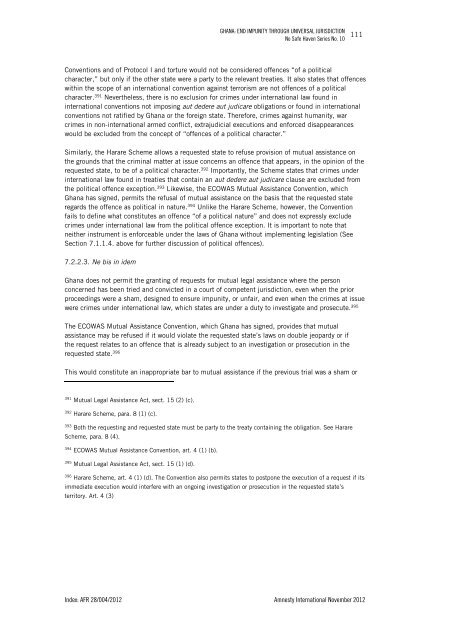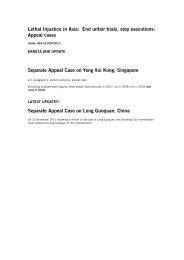Ghana - Amnesty International
Ghana - Amnesty International
Ghana - Amnesty International
Create successful ePaper yourself
Turn your PDF publications into a flip-book with our unique Google optimized e-Paper software.
GHANA: END IMPUNITY THROUGH UNIVERSAL JURISDICTIONNo Safe Haven Series No. 10111Conventions and of Protocol I and torture would not be considered offences “of a politicalcharacter,” but only if the other state were a party to the relevant treaties. It also states that offenceswithin the scope of an international convention against terrorism are not offences of a politicalcharacter. 391 Nevertheless, there is no exclusion for crimes under international law found ininternational conventions not imposing aut dedere aut judicare obligations or found in internationalconventions not ratified by <strong>Ghana</strong> or the foreign state. Therefore, crimes against humanity, warcrimes in non-international armed conflict, extrajudicial executions and enforced disappearanceswould be excluded from the concept of “offences of a political character.”Similarly, the Harare Scheme allows a requested state to refuse provision of mutual assistance onthe grounds that the criminal matter at issue concerns an offence that appears, in the opinion of therequested state, to be of a political character. 392 Importantly, the Scheme states that crimes underinternational law found in treaties that contain an aut dedere aut judicare clause are excluded fromthe political offence exception. 393 Likewise, the ECOWAS Mutual Assistance Convention, which<strong>Ghana</strong> has signed, permits the refusal of mutual assistance on the basis that the requested stateregards the offence as political in nature. 394 Unlike the Harare Scheme, however, the Conventionfails to define what constitutes an offence “of a political nature” and does not expressly excludecrimes under international law from the political offence exception. It is important to note thatneither instrument is enforceable under the laws of <strong>Ghana</strong> without implementing legislation (SeeSection 7.1.1.4. above for further discussion of political offences).7.2.2.3. Ne bis in idem<strong>Ghana</strong> does not permit the granting of requests for mutual legal assistance where the personconcerned has been tried and convicted in a court of competent jurisdiction, even when the priorproceedings were a sham, designed to ensure impunity, or unfair, and even when the crimes at issuewere crimes under international law, which states are under a duty to investigate and prosecute. 395The ECOWAS Mutual Assistance Convention, which <strong>Ghana</strong> has signed, provides that mutualassistance may be refused if it would violate the requested state’s laws on double jeopardy or ifthe request relates to an offence that is already subject to an investigation or prosecution in therequested state. 396This would constitute an inappropriate bar to mutual assistance if the previous trial was a sham or391Mutual Legal Assistance Act, sect. 15 (2) (c).392Harare Scheme, para. 8 (1) (c).393Both the requesting and requested state must be party to the treaty containing the obligation. See HarareScheme, para. 8 (4).394ECOWAS Mutual Assistance Convention, art. 4 (1) (b).395Mutual Legal Assistance Act, sect. 15 (1) (d).396Harare Scheme, art. 4 (1) (d). The Convention also permits states to postpone the execution of a request if itsimmediate execution would interfere with an ongoing investigation or prosecution in the requested state’sterritory. Art. 4 (3)Index: AFR 28/004/2012 <strong>Amnesty</strong> <strong>International</strong> November 2012
















